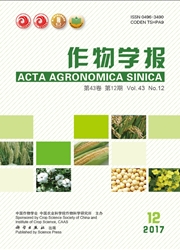

 中文摘要:
中文摘要:
选用氮素利用高效型和低效型具有代表性的12个粳稻品种,研究225kghm^-2施氮条件下各基因型水稻物质生产与积累特性及其与氮利用效率的相互关系。结果表明,不同氮效率类型水稻群体茎蘖数没有鲜明的特征差异,但氮高效类型水稻的茎蘖成穗率极显著高于氮低效类型。氮高效类型水稻物质生产与积累具有“前稳、中小、后高”的特性,即在有效分蘖临界叶龄期前具有适宜的叶面积、光合势和群体生长速率,物质积累具一定优势,但其占全生育期总积累量的比例较少;有效分蘖临界叶龄至拔节阶段,无效分蘖发生少,叶面积指数、光合势、群体生长速率低,物质积累也不具优势;拔节以后,具有良好的群体质量,叶面积增长较快,群体光合势和生长速率加大,物质积累优势较为明显。不同氮效率类型水稻物质生产与积累的特性不仅可以解释水稻氮素利用的品种间差异,同时也为生产上提高水稻氮利用效率提供了可行的调控途径。
 英文摘要:
英文摘要:
N use efficiency is varied in different rice genotypes. Therefore it is necessary to identify the physiological mechanism of N absorption and utilization in different rice genotypes in order to increase N use efficiency through rice cuhivar improvement. In this research, a field experiment with 225 kg ha^- 1 N fertilizer application was carried out in 2006 on the farm of Yangzhou University, Jiangsu province, China. Using twelve rice genotypes (6 N-efficient and 6 N- inefficient ) selected from 120 rice cuhivars in 2004 and 2005 to investigate the characteristics of rice matter production and accumulation. Relationship between N use efficiency and indexes of rice matter production and accumulation also analyzed. Results showed that although there was no significant difference in number of tillers per unit ground area between two rice types with different N use efficiencies, the percentage of productive tillers of N efficient rice type was obviously higher than that of N inefficient rice type. The characteristics of rice matter production and accumulation at different growth stages and their correlations with N use efficiency revealed that, for N efficient rice type, the rice matter production and accumulation was steady in early growth period, a little in middle growth period and large in later growth period. That is to say the N efficient rice type had proper leaf area index (LAI), photosynthetic potential (PP), crop growth rate (CGR), and a superior matter accumulation before the critical stage of productive tillering, although its ratio of dry matter to the total accumulation in whole life was relatively low; the LAI, PP, CGR and dry matter accumulation were lower during the period from the critical stage of productive tillering to elongating; and an increased leaf area, photosynthetic potential and an accelerated crop growth rate resulting from better population quality after the stage of elongating. According to the research results, the different characteristics of rice matter production and
 同期刊论文项目
同期刊论文项目
 同项目期刊论文
同项目期刊论文
 期刊信息
期刊信息
